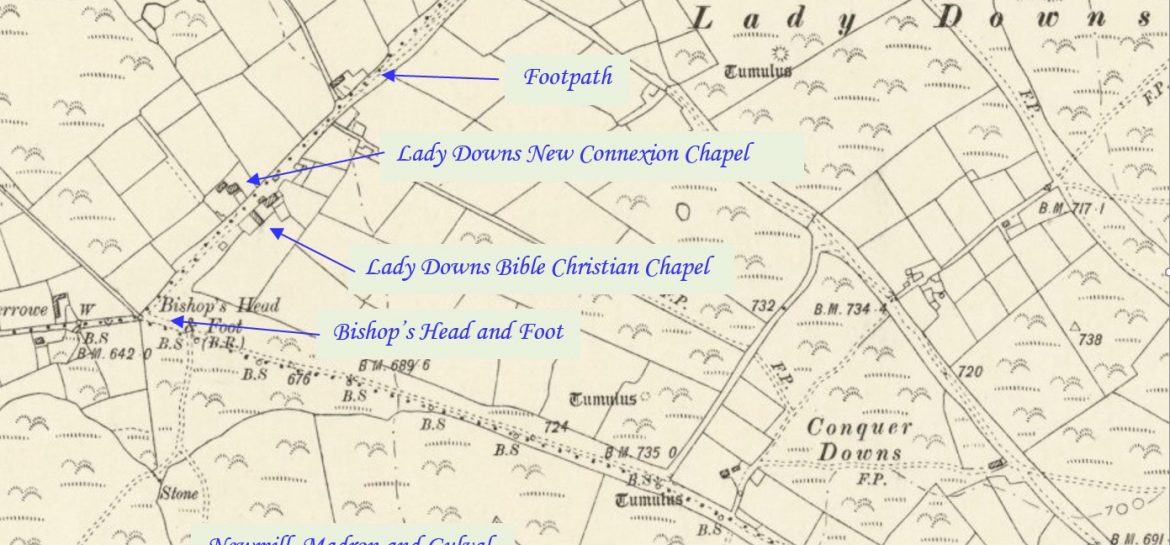
Lady Downs is an area between Newmill and Zennor. The whole area has a wealth of antiquities and was very heavily mined in the past. Jean Nankervis describes it as Mill Downs in her records, which is the name of the nearby farm. It is now moorland with farms and hamlets. The two Chapels in this area are shown on the 1888 map but not on later editions. This is due to the end of the tin mining in the area and many people emigrating to America to find employment. The Chapels are most easily located on a map as being on a dead-end lane going north from Bishop’s Head and Foot. The nearest named hamlet is now Higher Kerrow. According to Peter Pool page 412 the tri-junction of Zennor, Gulval and Towednack was in 1613 called “Meane Crouse an Especk”, i.e. cross stone of the bishop. The site is now marked by a flat granite slab in a cart track and known as the “Bishop’s Head and Foot”. It is said in Towednack that the cross from here was broken up by a Zennor farmer. (National Grid 464363). This article was compiled by Val Thomas of St Ives Old Cornwall Society with helpful information supplied by Jean Nankervis of Wicca Farm and Cedric Appleby.
1751: Ten years after George Whitfield founded the first Methodist Society in London, the Countess of Huntingdon made him her chaplain.
1767: The Zennor Methodist Society had 20 members and was run by a select band of 5 men: Stephen Nicholls and Sam Mitchell of Kerrow, Ephraim Blight, William Chellew and Francis Nance. Only 5 of the ordinary members were men, the rest were all women:
Robert Philips, tinner, of Porthmeor and his wife Jane
William Richards, farmer of Treen
Mary Richards, servant
Jane Perry married
Phyllis Thomas married
Arthur Berryman of Boswednack and his wife Mary
John Thomas and his wife Mary
Margaret Curnow, widow
Matthew Thomas, his wife Ann and daughters Ann and Elizabeth, unmarried
Ann Christopher, married, from Trewey
Elizabeth Philips, widow with daughter Catherine, unmarried
Alice Richards, widow
Mary Polmear, married
1797: The Methodist New Connexion was formed and a chapel built at Mill Downs.
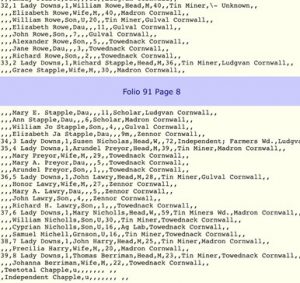 The 1861 census
The 1861 census
1861: The census to the right shows no unoccupied houses, but there are only 8 noted, 1 Teetotal Chapel and 1 Independent Chapel.
1865: In the St Ives circuit there were 2 ministers and 6 local preachers to serve 4 chapels and 1 preaching place. The circuit membership stood at 157 plus 2 on trial and there were 22 teachers and 130 scholars in the circuit Sunday Schools.
1871: Lady Downs has 10 houses with 2 unoccupied:
- William Bolitho 48, farmer with his wife and 2 lady boarders.
- William Mitchell age 23, tin miner and Mary, wife 23.
- Henry Roach 41, tin miner, wife Jane 42, 7 children and mother-in-law aged 72. With an 18-year-old tin miner boarder.
- A ruinous house
- Robert Newton 44 a butcher and his wife and son.
- Henry Roach 66, stone mason, his wife aged 64 and Elizabeth Pearce, a lodger with 3 children.
- Thomas Hall 40, tin miner, his wife Jane 45, six children including Eliza age 14 and Francis aged 7.
- Another unoccupied property.
- Mary Nicholls 69 with sons of 27 and 25 and grandson Emmanuel 12 who are all tin miners.
- Francis Stone 78, farmer with his wife and son of 45 who was born blind.
- Arundle Prior 49, tin miner with his wife Mary 38 and five children – Arundle Prior age 10 is listed as a tin miner.
- Mary Ann Lawry 41 with 8 children.
1873: Eliza Hall, who lived in Lady Downs, has her story later in this profile.
1877: The OS map shows a Bible Christian Chapel and a new Connexion Chapel at Mill Downs also known as Lady Downs.
1878: The membership of the St Ives circuit is just 60. The Missionary report for the year states that the cause was feeble at Lady Downs and Halsetown and the Zennor chapel had no congregation worth naming. (I have found no evidence of where in Zennor the Bible Christians met.)
On 3rd March, the “Cornish Telegraph” wrote that an inquest had been held in the Primitive Methodist chapel into the death of an illegitimate baby.
1883: Kelly’s Directory of Cornwall says “…others for Bible Christians and Teetotal Methodists at Lady Downs.”
1888: Neither the Methodist nor the Bible Christian Chapels are shown on the OS map.
1891: The census for Lady Downs shows Jane Hall, Head, widow 65, farmer, born in Sancreed with her children: Thomas J Hall 31, Richard Hall 22, William Hall 21 and Mary A Hall 20. They were all farmers. (The husband, Eliza and son Francis had all died since the last census) There is one other building noted but it is unoccupied, as are the next two listed properties in Wheal Lady and Conquer Downs. There are no miners listed nearby.
In October, the Methodist New Connexion at Lady Downs Chapel had their harvest festival on Sunday in the afternoon and evening.
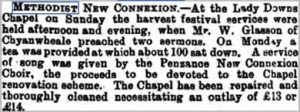 From the Cornish Telegraph Thursday 22nd October 1891
From the Cornish Telegraph Thursday 22nd October 1891
1906: A few more buildings are shown on this map, but no chapels and the extra buildings may be agricultural.
2011: The census shows 19 people residing in the same postcode as the Chapels.
2021: One Chapel is now a dwelling, and we could not identify the other among the farm buildings.
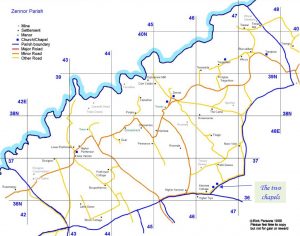 This sketch of the parish of Zennor shows the 2 chapels on the bottom right; they are in different parishes.
This sketch of the parish of Zennor shows the 2 chapels on the bottom right; they are in different parishes.
We searched for evidence of the New Connexion Wesleyan Chapel, which was up the track and opposite, but could not see any obvious link to the buildings which were in the farmyard. NB. Conker Downs, Conquer Downs and Cornequidden Downs are all the same place, just changed by dialect.
The Penwith Local History Group in conjunction with Madron Old Cornwall Society found the story of Eliza Hall and commemorated her with a headstone in Gulval cemetery. Her story is below:
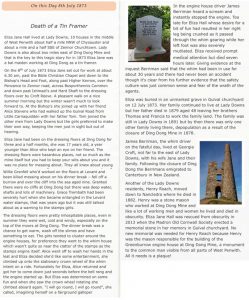
Resources:
The St Ives Bible Christian Methodist Church – J.C.C. Probert. biblechristian.org.uk
Penwith Local History Group – Chapels 1893
‘Find my Past’ newspapers
Peter Pool – peterpool.co.uk
I can find no records for either chapel at Kresen Kernow and no information at all on the New Connexion teetotal Chapel other than 1 newspaper report.
